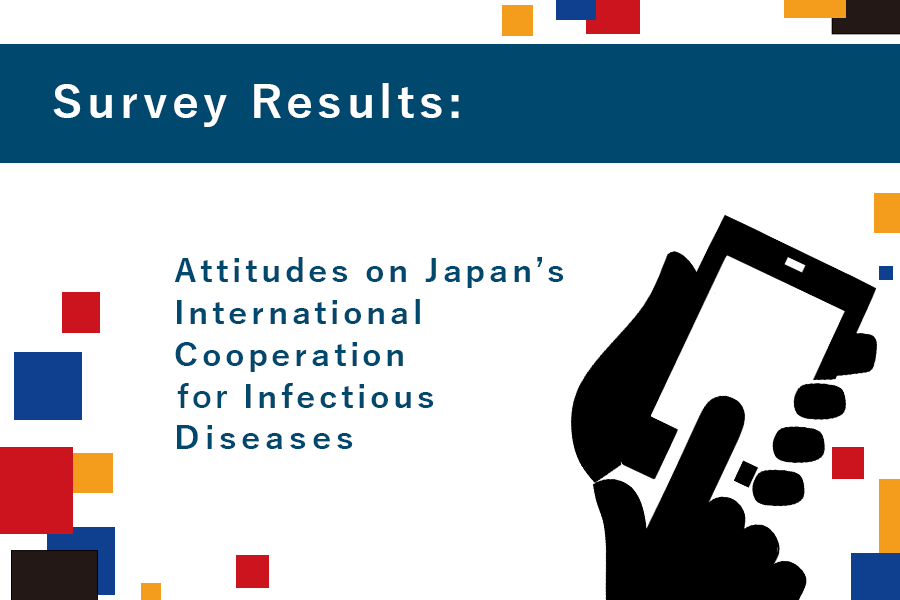
Purpose
In February 2022, FGFJ conducted an online survey to assess and visualize changes in the Japanese general public’s understanding of infectious diseases upon experiencing the COVID-19 pandemics, as well as their awareness of infectious diseases in developing countries and Japan’s international cooperation in the field of healthcare. Results from this survey will be used to inform policy activities for encouraging Japan to play a more active global role in addressing infectious diseases affecting countries around the world.
A summary of the survey and findings is illustrated below, and a final report on the findings will be published at a later date.
About the Survey
The survey was conducted as a smartphone questionnaire over three days (February 24–26, 2022). Participants consisted of 1,578 individuals in Japan aged 15 to 69. Responses were evaluated by age groups and by sex within each age group in line with the national census. The ratio of individuals identifying as male and female was approximately 50:50 (49.4% male, 50.1% female), and the average age of participants was 43 years of age.
Key Findings
Over 90% of respondents felt that infectious diseases have no borders
Participants were asked four questions regarding their changed perception and attitudes around infectious diseases after experiencing the COVID-19 pandemic. The survey included questions about the person’s level of concern about infectious diseases, appreciation and support for health workers, the importance of worldwide cooperation , and whether they felt that infectious diseases had “no borders.” 92.3% of the respondents said they “realize that infectious diseases have no borders” in response to questions on how they feel about infectious diseases based on their experience with COVID-19.
Nearly 70% were concerned about the COVID-19 situation in developing countries
Participants were also asked multiple questions regarding COVID-19 and developing countries, as well as Japan’s involvement in assisting these countries during an infectious disease outbreak. In one question, 67.0% of respondents said that they were concerned or strongly concerned about the COVID-19 situation in developing countries.
"How concerned are you about the COVID-19 situation in developing countries?"
A majority felt that Japan should provide support for developing countries struggling with infectious diseases (78.5%) and that Japan should increase its health ODA (72.2%)
"Japan should provide support for developing countries struggling with infectious diseases?"
After stating that several infectious diseases are prevalent in the world other than COVID-19 (such as HIV, TB, and malaria), participants were asked if they thought Japan should provide support to developing countries struggling with these infectious diseases. An overwhelming 78.5% of participants agreed or strongly agreed that Japan should provide support to developing countries battling infectious diseases.
When asked about Japan’s ODA focused on health, 72.2% of participants agreed or strongly agreed that the percentage of Japan’s ODA focused on heath should be increased. In addition, when asked about their opinions on Japan’s health ODA having increased about three times between 2019 and 2020, a majority of respondents responded also gave an affirmative response (72.4%).
"Japan should increase the percentage of its ODA focused on health"
Women are more concerned about infectious diseases in developing countries and more supportive of international cooperation in the field of health
Comparing answers from men and women who responded, result showed that women respondents were more concerned about infectious diseases in developing countries and more supportive of international cooperation in the field of health. Women across all age groups also responded positively about increasing Japan’s ODA being focused on health.
There is little interest in health topics amongst younger age groups
By age group, interest and awareness of health topics was low amongst younger age groups, with the lowest interest shown in men ages 15-39. When looking at the percentage of respondents by occupation who answered that they “did not know” that there are serious inequalities between developed and developing countries with regard to vaccines, testing, and treatment for COVID-19, students were the most likely to respond at 30.9%. Conversely, both men and women respondents in their 60s showed to have the highest interest in and awareness of health topics.
